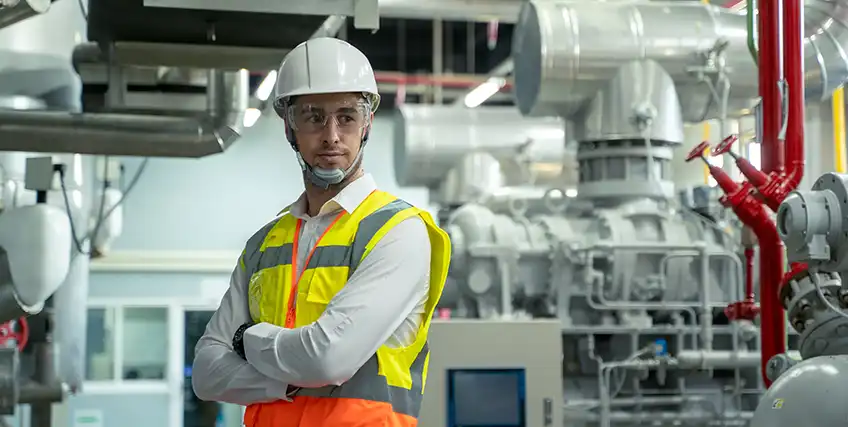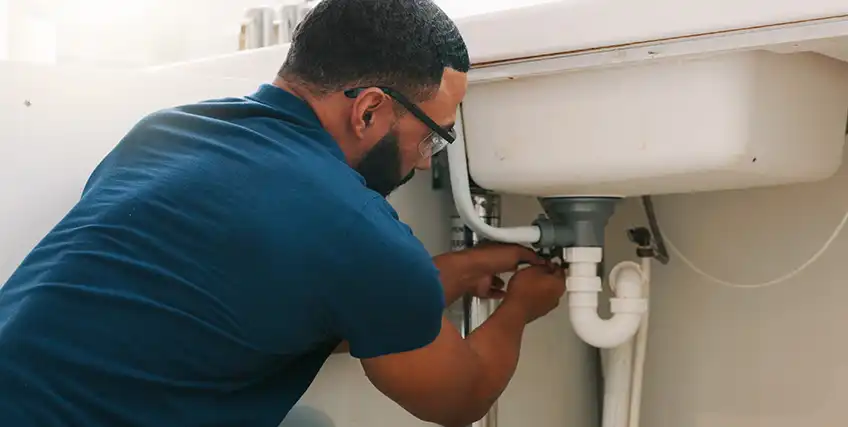Your Complete Guide to Applying for a Loan for Plumbing and HVAC Services
March 11, 2025 | Last Updated on: March 11, 2025

Adequate financing is crucial to growing an HVAC business, whether you're just starting or looking to expand. When you don't have the cash, getting a loan for HVAC business owners can help you buy or upgrade equipment, launch a marketing campaign, hire additional workers, or provide working capital while waiting for customers to pay. This guide is designed to help you learn about applying for a loan for plumbing or HVAC businesses, improve your approval odds, and how to use the funds for maximum impact.
An In-Depth Guide About Loans for HVAC Business Owners
This guide covers everything from assessing your financing needs to choosing the right loan type, improving your credit score, comparing lenders, and making the most of your loan funds.
Importance of Financing for HVAC Business Growth
An HVAC business requires significant investment in equipment, tools, and personnel. To attract customers, you must also spend effectively on marketing and referral campaigns. Financing can help cover these expenses, support cash flow, and enable strategic expansion. The right loan for HVAC business owners can make the difference between stagnation and substantial growth.
Understanding Business Financing Needs
Assessing Your Business Needs
Before applying for a loan for HVAC business owners, it's essential to determine why you need financing. Common reasons include:
- Expanding operations or opening a new location. Growth opportunities may arise as your customer base increases. Whether you want to add another office, warehouse, or service area, financing can help you cover the costs of securing a new property, furnishing it with necessary HVAC tools, and hiring additional staff to manage operations.
- Purchasing air conditioning equipment or service vehicles. HVAC businesses rely on specialized tools, machinery, and vehicles to provide heating and cooling system services efficiently. Equipment financing allows you to acquire the latest energy-efficient systems, diagnostic tools, and service trucks without depleting cash reserves. Keeping up with technological advancements can also give your business a competitive edge with customers looking for energy savings.
- Hiring additional staff to meet growing demand. As your business grows, the demand for qualified technicians and office staff will increase. A loan can help you cover salaries, training programs, and onboarding costs, ensuring you have a skilled workforce ready to handle higher customer demand and maintain service quality.
- Maintaining inventory. While HVAC business owners typically don't take out loans for HVAC systems, they may keep a small number of units in stock to quickly meet a homeowner's needs.
- In-house financing. Some HVAC companies offer short-term in-house HVAC system loans to customers while they evaluate rebates, tax credits, or special financing options for HVAC systems. This can provide an additional income source to supplement their services, but financing offers require extra capital to carry these purchases until the loans are repaid.
- Covering operational expenses during slow seasons. HVAC businesses often experience seasonal fluctuations, with peak demand in summer and winter but slower periods in spring and fall. Access to financing can help you manage cash flow during off-seasons, covering rent, payroll, marketing efforts, and other ongoing expenses to ensure business stability year-round.
Estimating Your Loan Amount
Having a clear understanding of how much capital you need is crucial. A well-planned budget increases your credibility with lenders and helps you secure the right loan for HVAC business owners. Borrowing more than you need can also impact your cash flow with larger-than-necessary payments and interest expenses.
To estimate your loan amount effectively, consider the following steps:
- Pricing Out Equipment Costs: Identify the HVAC tools, machinery, and vehicles needed for your business. Research the latest industry prices and get quotes from different vendors to ensure you get the best deal.
- Getting Quotes from Vendors: Speak directly with equipment suppliers and financing companies to obtain accurate cost estimates. Some vendors may offer in-house financing options or bulk discounts that could reduce your overall loan requirements.
- Talking with Industry Experts: Consult with HVAC business mentors, industry associations, or financial advisors with business expansion experience. Their insights can help you refine your budget and avoid common financial pitfalls.
- Asking Questions of Competitors and Peers: Network with other HVAC business owners who have recently taken out loans. Learning about their financing experiences and loan amounts can give you a realistic benchmark for your own borrowing needs.
- Considering Additional Costs: Factor in licensing fees, insurance costs, marketing expenses, and potential unexpected expenses. A buffer in your loan amount ensures you don’t run out of capital during critical business operations or in case unexpected expenses occur.
- Projecting Your Return on Investment (ROI): Determine how the loan will impact your revenue growth by calculating your ROI. Are the additional revenue and profitability worth the effort and added stress of monthly payments? Understanding your projected income after securing the loan helps ensure you borrow only what you can afford to repay.
By following these steps, HVAC business owners can accurately determine their financing needs and avoid borrowing too little or too much, ensuring their loan effectively supports business growth.
Types of Loans Available
Many plumbing and HVAC business owners use different types of loans to suit their needs. Applying for a loan for plumbing or loan for HVAC business owners is generally the same application process as any other type of business. While it is preferable to loan under the business name, sometimes you must borrow through personal loans due to the lender's income or credit requirements.
Business Loans
Traditional Bank Term Loans
Traditional banks offer term loans with fixed interest rates and repayment schedules. These are ideal for well-established HVAC businesses with strong financials. Term loans are ideal when you know how much you need to borrow and want monthly payments that do not change over the course of the loan.
SBA Loans
The Small Business Administration (SBA) offers government-backed loans with favorable terms. The SBA offers 504 loans, 7(a) loans, and SBA Express loans to match your funding needs. They require thorough documentation but provide competitive interest rates and longer repayment periods. Due to Federal government guarantees, lenders are often willing to lend to startups and borrowers with lower credit scores.
Equipment Financing
Equipment financing is specifically designed to purchase HVAC tools and machinery. The equipment serves as collateral, making it easier to qualify for these loans. Leasing is a popular form of equipment financing because of its flexibility. When the loan term is up, you can purchase the equipment or return it and enter a new lease. This allows you to stay current with the latest models or upgrade to larger or more powerful equipment as your needs evolve.
Business Lines of Credit
A business line of credit provides flexible financing for business owners to borrow only what they need and pay interest accordingly. Business lines of credit typically have variable interest rates. You’ll have payment options of interest-only monthly payments or extra payments to reduce the balance. You'll only pay interest on the amount you borrow, and as you pay down your balance, your available credit increases.
Invoice Financing
For HVAC businesses with outstanding invoices, invoice financing allows you to borrow against unpaid invoices, improving cash flow while waiting for client payments. Invoice financing and merchant cash advance (MCA) offer quick access to cash for borrowers who may have trouble getting approved for traditional bank loans. Repayment is typically made as you collect customer payments, but its interest charges and fees tend to be higher than a conventional loan.
Personal Loans
Personal Loan
If a business loan is unavailable, a personal loan can provide funding. However, this places personal assets and credit at risk. Personal loans are based on your individual credit score and income. These loans are usually much smaller than business loans and may have a shorter repayment period.
Personal Credit Card
Many business owners use their personal credit cards to pay for business expenses. This allows them to use existing credit lines to pay bills without needing to apply for a new loan or business credit card. While convenient, using a personal credit card for business expenses can lead to high-interest debt if not managed properly. This can also make tax planning more difficult as you try to sort out which charges are for business and which are for personal use.
Home Equity Loan or Line of Credit (HELOC)
Leveraging home equity can provide low-interest financing but risks your home if the business struggles. A home equity loan provides a lump sum of cash and fixed monthly payments. It has a fixed interest rate throughout the loan term.
HELOCs are flexible lines of credit backed by the value of your home. Its interest rates are variable, and you only pay interest on the amount borrowed. You can use the credit line repeatedly throughout the draw period before it converts into a fully amortizing loan.
Cash-Out Refinance
Refinancing a mortgage to access cash can be an option, but it extends debt repayment terms. Additionally, if you have a low interest rate on your current mortgage, you'll lose that rate as you replace it with current market rates. Cash-out refinances can also be expensive as you pay origination fees, title, escrow, points, and other fees.
Cash-Secured Loan
Using personal savings, CDs, investments, or other assets as collateral can secure a lower-interest loan while keeping business credit separate. These loans allow HVAC business owners access to cash without selling their assets, which could trigger early withdrawal penalties or tax consequences. Since the loans are secured by an asset, you may receive a lower interest rate than an unsecured loan.
Improving Credit Before Applying
Understanding Credit Scores
Lenders consider both personal and business credit scores when evaluating loan applications. A strong credit profile increases approval chances on a loan for HVAC business owners and secures better terms. As your score increases, you may become eligible for certain loan programs that borrowers with lower credit cannot access.
Steps to Improve Credit
- Pay Down Existing Debt: Credit utilization is the ratio of outstanding balances to credit limits. This factor makes up 30% of your credit score. Paying down your credit cards to reduce credit utilization is one of the fastest ways to improve creditworthiness. Ideally, the balance on each of your credit cards should be 30% or less.
- Correct Errors on Credit Reports: Regularly check and dispute inaccuracies on credit reports. A Federal Trade Commission study found that roughly one in four people have an error on their credit report that could impact their score. Obtain your free credit report from each credit bureau at AnnualCreditReport.com.
- Establish a History of On-Time Payments: Consistent payments build a reliable credit history. While this factor takes time to establish, at 35%, it’s the most critical factor in your credit score. Consider setting up automatic payment of the minimum amount due to avoid missing a payment, incurring late fees, and harming your score.
- Build Business Credit: Not only do you need to maintain good personal credit, but you should build credit in your business name as well. Open business credit accounts and separate personal finances from business expenses. Establishing trade lines in your business name with companies that report to Dun & Bradstreet, Experian, and others is important.
Comparing Lenders
Factors to Consider
- Interest Rates and Fees: Compare APRs and hidden fees. While one lender may offer a lower interest rate, the total cost of credit (APR) may be higher when factoring in fees.
- Loan Terms and Flexibility: Look for repayment schedules that align with your cash flow. You can reduce interest costs by taking a shorter loan term, but your monthly payments will be higher. Consider a longer term if you're worried about being able to make the payments each month.
- Lender Reputation and Customer Service: Read reviews and check ratings. You may never need to speak with customer service, but having a lender with a good reputation offers peace of mind in case you do.
- Speed of Approval and Funding: Consider how quickly you need access to funds. Sometimes, it may be worth paying extra to get the money quickly over a lender (or loan type) that can take weeks to get approved.
Researching Lenders
- Traditional Banks vs. Online Lenders: Banks may offer lower rates but have stricter requirements, while online lenders provide faster approvals.
- Importance of Reading Reviews and Testimonials: Learn from other business owners' experiences. Be aware that some online comparison sites have fake reviews that put a lender in a positive (or negative) light.
- Recommendations from Industry Peers: Seek advice from other HVAC professionals about their financing choices. Attend conferences and local meetups with peers and ask questions about where they borrow and their experience with that lender.
Consulting with Accountants and Financial Advisors
A financial expert can help determine the best loan for HVAC business owners, ensuring financial stability and tax advantages.
- How an Accountant Helps with Loan Approval: Accountants can prepare financial statements and ensure loan applications meet lender requirements. An accountant or tax professional can also advise how different types of loans will impact your taxes.
- Finding a Reliable Accountant or Financial Advisor: Look for professionals with experience in the HVAC industry. Ask your peers for referrals.
The Bottom Line
To secure a loan for HVAC business owners, carefully assess financial needs, research lenders, improve credit, and choose the right type of loan. Once approved, using the funds strategically ensures long-term business success. Taking an informed approach to financing can lead to greater stability and expansion. With the right loan for HVAC business owners, achieving business goals becomes a reality.
Frequently Asked Questions (FAQs)
Can I Get a Loan to Start an HVAC Business?
While traditional banks tend to focus on established businesses, the SBA is a great place to get a loan for HVAC business owners. Alternatively, many aspiring entrepreneurs fund their businesses using personal savings, credit cards, and home equity.
Is Owning an HVAC Business Profitable?
When you run your business effectively and take care of customers, you can generate significant profits.
What Credit Score is Needed for HVAC Financing?
Credit score requirements vary by lender and the type of loan you're applying for. The SBA does not have a minimum credit score, but lenders offering its loans may have different requirements. While they typically have higher interest rates, borrowing from online lenders, invoice factoring, and merchant cash advance can provide access to capital if you have bad credit.
How Much Does It Cost to Start an HVAC Business?
Starting an HVAC business doesn't have to be expensive. Many entrepreneurs buy equipment as needed to reduce their initial expenses and avoid buying items they don't actually use. You can start an HVAC business with an initial investment of $3,000 to $12,000 instead of spending $100,000 or more to buy everything at once.
What is the Average Profit of an HVAC Business?
The average profit margin ranges between 5% and 20%. You can increase your profitability by boosting revenue with additional services and controlling expenses.




